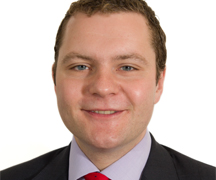Career Summary
Think tanker turned public affairs professional – and I run a non-profit in my spare time.
Academic/Professional Qualifications
BA (Hons), Philosophy, Politics & Economics and Graduate Diploma in Law
What does your current role entail on a day to day basis?
I meet the staff I manage more or less daily to agree future activity and priorities.
Obviously I spend a lot of time meeting or on the phone to clients. I do a lot of research work for them, and some of the biggest impact we’ve had is through reports I wrote that combined new data on an existing problem with suggested solutions for policymakers.
Then there’s the broad category of new business – work to market the firm and identifying and pursuing potential clients.
Which campaign/issue are you most proud to have been involved in for a client or organisation that you’ve worked for?
I wrote a report for a client on the government’s likely approach to a major train operator the client owned shares in. I resisted the temptation to sit on the fence and instead made a strong recommendation. By telling the client to sell their stake in good time - before the share price fell 30% - I saved them millions of dollars.
Tell us about your campaigning work as Director of the Centre for Crime Prevention. What added value does this bring to day-job client work?
I set up the Centre for Crime Prevention because crime is an issue I’m passionate about. I was so weary of hearing well-funded anti-prison groups make ill-informed, misleading claims about sentencing that went unchallenged in the media. It’s one of the reasons prison is under-used for serious, repeat offenders - and this puts the public at much greater risk of crime. I didn’t see the relevance for clients.
Much to my surprise, it’s turned out to be enormously helpful for the day job and our Managing Director has been really encouraging. It’s given me a lot of transferable experience: gathering data, writing reports, appearing on broadcast media, public speaking, drafting press releases, giving quotes to the papers and talking to leading journalists.
Has your Legal Diploma added value to your public affairs work?
Legal training and a decent general knowledge of the law are very helpful, but they don’t come into my day to day work very much.
What do you enjoy about working in public affairs?
Many of the clients I work with are exceptional at what they do – so in itself it’s exciting to be part of their teams and their strategy. It’s enormously rewarding to be able to add value to their business and come up with ideas to boost their bottom line.
I enjoy working with a team, managing good people and the range of individuals you get to meet in public affairs.
I like that many of the things I’d be doing anyway – campaigning, attending political events and reading about policy – help me do the job I’m paid to do.
How relevant is being a Political Party member for Public Affairs work?
You’re either a true believer or you’re not, and no one should join a party unless they broadly support it. But at least for agency roles I think it’s a massive advantage. Alex Singleton has a great article addressing this on his blog. The problem for those who aren’t active in politics outside working hours is that they’re competing with so many people who are. The impact of attending any one event is usually negligible – although jobs, new business and big wins for existing clients can all happen this way. But over the years going to one or two Westminster events a week, and knocking on doors for candidates and MPs, really adds up. You end up with a great personal network and a much deeper understanding of policy, and of the motivations of and pressures on inhabitants of the political world. We all have other interests to pursue, but it’s worth asking yourself why you entered public affairs if attending a think tank event and chatting to attendees over a glass of wine sounds like a waste of an evening to you.
When you’re getting started in particular an easy way to show added value to a boss is picking up knowledge and contacts that they lack. It gives confidence to clients, too, if you can tell them things they couldn’t have just read on Guido or CoffeeHouse.
You can do some of the above without joining a party - but it tends not to happen that way. In theory, people with partisan leanings can struggle to understand others’ views, or fail to get on with people with different views, but I’ve never actually met anyone like this who works in public affairs. Either they don’t enter the industry or they aren’t offered jobs in it. Lobbyists of all political colours tend to be sociable and easy to get on with.
What's your prediction for the next General Election result?
It depends almost entirely on the economy in 2015.
| Quick-Fire Round | |
|---|---|
| If you weren’t a Government Relations professional, what would you be? | PR or working at a think tank |
| LinkedIN or Twitter? | I don’t spend much time on either, to be honest |
| Tweet your career-to-date in 140 characters or less | Intern, think tank researcher, public affairs |
| What’s your Media diet? | I read a lot of magazines, blogs and the web sites of the nationals |
| Favourite Film | Casablanca, Amazing Grace |
| Guilty pleasure | Chicken madras |














